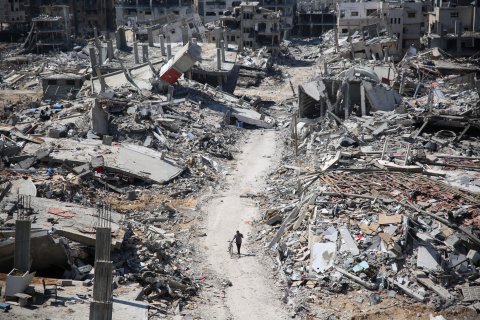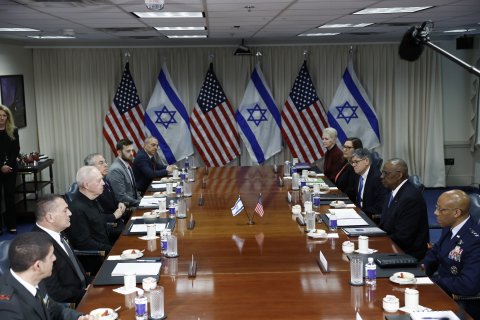DANIEL BUSH
Israel has undoubtedly weakened Hamas after six months of fighting in Gaza, but the short-term tactical gains against the militant group behind the Oct. 7 attack may come at a significant cost to Israel's long-term security as well as complicating potential post-war efforts to resolve one of the world's most intractable conflicts.
The Israel Defense Forces have killed thousands of Hamas fighters and seized critical military infrastructure, reducing the group's ability to launch future attacks. But Israel's actions in Gaza have led to charges of genocide in international court, isolated the country from its closest ally, the United States, and damaged chances of securing a last peace in the Middle East.
"Israel is being sent before the International Court of Justice and condemned by the UN. And most important of all, its relationship with the United States is fraying at the seams," Mohammed Hafez, an expert on Islamic political violence and Middle East politics at the Naval Postgraduate School, told Newsweek.
"While Israel has achieved substantial military success in its campaign in Gaza, it has destroyed its image around the world," Hafez said.
As the war hits the six-month mark, Israel faces growing criticism for the humanitarian crisis in Gaza, where more than 30,000 people have been killed since the start of the conflict according to the Hamas authorities, which do not say how many of the group's fighters were among the dead.
Israel has yet to achieve its objectives of destroying Hamas and freeing all of the remaining hostages the group abducted in its attack last October, which killed approximately 1,200 people in Israel.
Israeli Prime Minister Benjamin Netanyahu also hasn't laid out a clear post-war plan for the Gaza Strip, raising questions about the war's longer-term ramifications — and renewing an existential debate about whether Israel can survive in its current form without agreeing to live alongside an independent Palestinian state or whether such an agreement would put it at greater risk.
Israel has made progress tactically, but has not solved the deeper problems in the Israeli-Palestinian conflict, Daniel Byman, a senior fellow at the Center for Strategic and International Studies, told Newsweek.
"There's the issue of what comes next in Gaza, and Israel hasn't addressed it," Byman said.

A man pushes a bycicle along as he walks amid building rubble in the devastated area around Gaza's Al-Shifa hospital on April 3, 2024.
Israeli officials and others argued defeating Hamas would make Israel safer.
"Ultimately we have a primary obligation to the citizens of the state of Israel. We need to protect them," Fleur Hassan-Nahoum, the outgoing deputy mayor of Jerusalem, told Newsweek.
"If we don't destroy Hamas, it's a green light for other terrorist organizations around the world to attack the West with impunity," said Hassan-Nahoum, who serves as a special envoy for Israel's Ministry of Foreign Affairs.
Still, the longer the war lasts, the murkier Israel's long-term security and political outlook will likely become. Most of the recent outbreaks of violence between Israel and Palestinians have been relatively brief. After a half-year of fighting the Israel-Hamas war is now one of the longest in Israeli history.
"It's not good for Israel to have a long-term war," Rona Yona, a historian at Tel Aviv University, told Newsweek. "The big question is if it serves Israel's" long-term interests or not, Yona said.
"We still don't know where it's headed."
'Total victory' out of reach
The war could continue for some time, given Netanyahu's insistence that Israel won't stop its military campaign until it achieves a total victory over Hamas, and frees the remaining roughly 130 hostages still being held in Gaza.
But hostage negotiations between Israel and Hamas have stalled. Many military and Middle East experts believe a complete military defeat of Hamas is unrealistic, since it would require Israel to send more ground troops into Gaza and lead to an even larger military and civilian death toll.
"Israel has almost no way to achieve Netanyahu's stated goal of total victory," Guy Ziv, a foreign policy and global security expert at American University, told Newsweek.
Netanyahu recently said Israel would achieve victory against Hamas if it kills the group's top two leaders in Gaza. "That's victory. Victory is within reach. It's a few weeks away," Netanyahu told a group of U.S. lawmakers in a March 27 meeting in Israel, according to a CNN report.
Newsweek reached out to the Israeli prime minister's office for comment.

U.S. Secretary of Defense Lloyd Austin speaks during a meeting with Israeli Minister of Defense, Yoav Gallant at the Pentagon on March 26, 2024 in Arlington, Virginia.
Whether Israel declares some sort of military victory in the coming weeks or months, Hamas' short-term defeat in Gaza is all but assured.
The IDF told reporters in late March that it had "dismantled" 20 out of Hamas' 24 battalions, with the last four left in the southern Gaza city of Rafah. Netanyahu told the congressional delegation that Israel had "no choice" but to advance into Rafah in order to defeat Hamas.
The international debate around a Rafah offensive underscored Israel's growing isolation from the U.S. and other allies.
President Joe Biden and senior U.S. officials warned Israel against a major ground incursion in Rafah without a plan to protect the city's civilian population. Some 1.4 million Palestinians are sheltering there, including hundreds of thousands displaced by fighting in other parts of Gaza.
The clash over Rafah between the White House and Israel led to the U.S. allowing passage of a United Nations security council resolution calling for a ceasefire in Gaza. The sparring marked a "low point" in recent relations between the two allies, Byman, the CSIS fellow, said.
"The Biden administration has been supporting Israel, but the tensions are growing," he said.
Public support for Israel in the United States has also dropped since the start of the war. Just 36 percent of Americans said they approved of Israel's military campaign in Gaza, according to a March Gallup poll, a drop from 50 percent who said they backed Israel in a Gallup survey taken last November in the first month of the war.
The decline in U.S. support combined with growing international outrage has left Israel lonelier than ever on the world stage.
"It's an unprecedented moment," said Brad Parker, the associate director of policy at the Center for Constitutional Rights, a legal group that sued Biden and other top administration officials alleging the U.S. helped Israel carry out a genocide against Palestinians in Gaza.
"The U.S. has always been able to lead and have other states follow their unconditional support of Israel. That's really been fractured," Parker told Newsweek.

People wave Palestinian flags as they protest in support of Palestinians outside an event attended by the U.S. vice president on April 4, 2024, in Charlotte, North Carolina.
Beyond the United States, the war has also complicated Israel's relationship with potential allies and adversaries alike across the Middle East.
The conflict in Gaza has delayed Israel's push to normalize relations with Saudi Arabia, part of an effort to expand the Abraham Accords brokered by the Trump administration, which have held up despite the war. The war has also raised tensions between Israel and Iran, which backs Hamas as well as Hezbollah in Lebanon and the Houthis in Yemen, among other groups in the region.
"None of these things make Israel stronger," Ziv said.
Cracks in wartime coalition
Where Israel goes from here depends on what happens after the war is over.
Netanyahu has flatly rejected the Biden administration's postwar plan for a two-state solution, which calls for Palestinian Authority rule over Gaza and the West Bank. Even if Israel backed the U.S. proposal it would likely face opposition from most Palestinians in both Gaza and the West Bank, recent polls show.
Among Palestinian adults in the West Bank and Gaza, 59 percent said they preferred that Hamas control Gaza after the war, according to a March poll conducted by the Palestinian Center for Policy and Survey Research. Just 24 percent said they preferred the Palestinian Authority to control Gaza when the war is over, the poll found.
Fifty-two percent also said they oppose a two-state solution, though support for the idea in Gaza, and opposition to violent resistance, has gone up since the war began, Dr. Khalil Shikaki, the director of the research center, told Newsweek.
"There is no realistic alternative to Hamas" in Gaza at the moment, Shikaki said in a phone interview from the West Bank. "Hamas has the support to continue to control Gaza, it has the bureaucracy that can exert that control, and it will have a residual military capacity to enforce order, even if Israeli soldiers are still occupying Gaza" after the fighting is over.

U.S. Secretary of Defense Lloyd Austin speaks during a meeting with Israeli Minister of Defense, Yoav Gallant at the Pentagon on March 26, 2024 in Arlington, Virginia.
Inside Israel, the idea of a two-state solution has lost traction since the Oct. 7 attack, polls show. Fifty-one percent of Israelis said they opposed the creation of a Palestinian state, citing security reasons, according to a February survey by the Israel Democracy Institute.
The sentiment aligns with Netanyahu's longtime opposition to an independent Palestinian state, but that hasn't boosted his popularity since the Oct. 7 Hamas attack.
Netanyahu was able to rally the country after the attack, and polls show the Israeli public remains largely supportive of the military campaign in Gaza. Another survey by The Israel Democracy Institute released in early March found that 64.5 percent of Israelis supported expanding the war into Rafah, compared to 21 percent who opposed it. The number was even higher among Jews in Israel, with 74 percent supporting expanded military action in Rafah.
Still, cracks in Netanyahu's emergency wartime government have started showing in recent months.
Netanyahu has faced public criticism from members of his war cabinet and the public appears eager for a change in leadership. A separate poll from February found that a majority of Israelis supported holding an early election, and would vote to oust Netanyahu's far-right coalition from power.
"It seems like the emergency coalition that was set up immediately after the outbreak of the war is beginning to disintegrate," said Yona, the Tel Aviv University historian.
Israel's political turmoil highlights divisions over Netanyahu's handling of the war as well as factors that preceded it — and how the fallout from Gaza could impact the country's security for years to come.
Netanyahu and his right-wing coalition may claim victory if Israel controls security in the Gaza Strip after the war and a two-state solution seems even less likely than it was before the Oct. 7 attack, said Shikaki. "That's satisfactory as far as the right wing in Israel is concerned," he said.
Eugene Kontorovich, the director of the international law department at the Kohelet Policy Forum, a conservative Israeli think tank, said Israel would be safer after it destroys Hamas.
"No country can live with a threat like that on its border," Kontorovich said.
But Shikaki and others said even if the war leaves Israel less vulnerable to attacks from Gaza in the short-term it may have caused a long-term setback. It would be a "huge strategic error" for Israel to defeat Hamas without pursuing a political resolution to the Israeli-Palestinian conflict, said Hafez of the Naval Postgraduate School said it
No comments:
Post a Comment